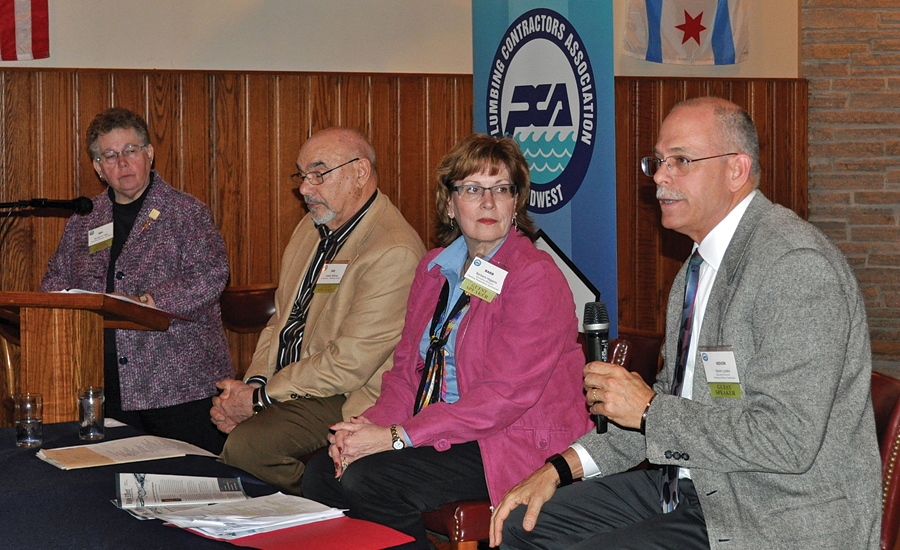More than 60 members of the Plumbing Contractors Association Midwest assembled at the Cafe Erie March 8th in Chicago for its membership meeting. With the Flint, Mich., water contamination crisis still unfolding at a rapid pace the group took in a panel discussion on the situation and how to avoid a similar situation in Illinois.
The panel was moderated by Bev Potts, the executive director of the Illinois chapter of the Plumbing Heating Cooling Contractors Association. The panel was made up of:
- Barbara Higgens – CEO/Executive Director of Plumbing Manufacturers International;
- Joe Albergo – Consultant for the Plumbing Council; and
- Kevin Lookis – Executive Director of the Northwest Water Commission.
First, the panel gave the specifics on how the crisis came to fruition. In April 2014 as a new pipeline from Lake Huron was being constructed, the city stopped receiving its water from Detroit and started to receive water from the Flint River. A water quality test found that the Flint River water was 19 times more corrosive than Detroit’s water supply and was not being treated properly with an anti-corrosion agent. Water began leeching and residents were drinking extremely high levels of iron with young children, unborn fetuses and the elderly being the most at risk.
Lookis stated there could be even greater health concerns beyond lead poisoning in Flint, including Legionella. “Bottom line, it opens the door for everything because of the nature of that water,” he said.
Higgens gave a refresher on the federal reduction of lead law that went into effect on Jan. 4, 2014. The law mandates the wetted surface of every pipe, fixture and fitting sold for a potable water application may not contain more than 0.25% lead by weight. The law modified the Safe Drinking Water Act of 1974.
Higgens mentioned how all the manufacturers involved with PMI are concerned about lead and how their fixtures are subjected to a performance tests such as NSF 61. She reminded the group that the precursor of the federal law came from a similar California state law that Vermont, Maryland and Louisiana followed suit on.
“We saw the writing on the wall,” she said. “(Those states) were playing the ‘how low can you go?’ game.”
And the major question is how the PCA and the industry in general can help prevent another Flint from happening. The panel said it is important to push elected officials to be proactive — something that should not be as difficult as it was six months ago.
“Educate the consumer,” Lookis said. “We all want to conserve water, but we want to promote good, quality water.”
PMI went up to Flint and donated 300 faucets and time to install the fixtures. They found it was critical to remind people that their products were not a reason for the crisis.
“It’s important to differentiate the source of the problem,” Higgens added. “We want to be a part of the solution.”
Albergo said education of the younger generation of plumbers, engineers and industry members is vital.
“We have a perfect example, not just theory, of what happens,” he stated. “This has happened and this is what we need to do.”
This article was originally titled “Proactive approach” in the April 2016 print edition of PM Engineer.




